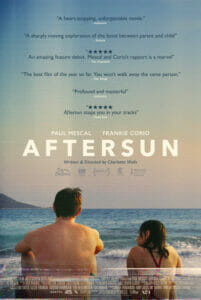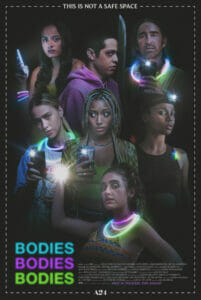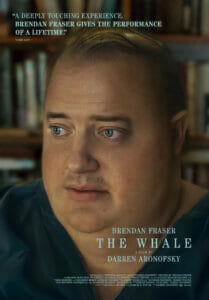SUMMARY
Considering the quality, quantity, and diversity of LGBTQ characters in films distributed under A24 and its labels in 2022, GLAAD has rated A24 with a GOOD grade.
Indie powerhouse A24 released several commercially and critically successful films that contained LGBTQ characters leading the story, not just in supporting roles. Academy Award-winning genre bender Everything Everywhere All at Once centered on a mother and queer daughter’s relationship throughout space and time. It was nominated for a GLAAD Media Award, alongside fellow A24 releases Bodies Bodies Bodies and The Inspection, the latter of which took home the GLAAD Media Award for Outstanding Film – Limited Release. There were also LGBTQ leads in Aftersun and The Whale, though The Whale was heavily criticized for its depiction of fat bodies. Overall, despite some missteps in smaller film Funny Pages, A24 has solidified itself as a leader in telling groundbreaking and nuanced LGBTQ stories.
HISTORY
Arthouse film executives Daniel Katz, David Fenkel, and John Hodges launched A24 Films in 2012 and began distributing films in 2013. That same year, the studio entered co-distribution deals with DirecTV Cinema and Amazon Prime. In 2016, the studios’ name was abbreviated to A24 and in October 2018, A24 and Apple announced a multi-year non-exclusive partnership. Then, in November 2019, the studio entered into a premium cable television broadcast deal with Showtime networks, covering all film releases through November 2022. A24’s previous LGBTQ-inclusive films include GLAAD Media Award winner and Oscar history-maker Moonlight (2016) and GLAAD Media Award nominee Lady Bird (2017).
AFTERSUN
WIDEST THEATRICAL RELEASE: 97 THEATERS
VITO RUSSO TEST: PASS
 This drama follows a father, Calum, and his daughter, Sophie, on a vacation, and is mostly told in flashbacks from Sophie’s perspective. The few moments we see of Sophie in the future include her in bed with another woman and caring for their child. In flashbacks to her as an 11-year-old, there are shots of her curiously looking at other girls and boys in a pool, and she kisses a boy one night. There is also a scene where Sophie spots two teen boys kissing and simply watches, not telling anyone. The whole film is tinged with the curiosity of coming into one’s own at that age. Most of the movie’s focus is on the relationship between Sophie and Calum. Sophie’s queerness in the future is not a focal point of that timeline, simply a facet of her life. This film sets a good example of how to include a protagonist’s queerness explicitly in a narrative, even if it is not the central theme of the film.
This drama follows a father, Calum, and his daughter, Sophie, on a vacation, and is mostly told in flashbacks from Sophie’s perspective. The few moments we see of Sophie in the future include her in bed with another woman and caring for their child. In flashbacks to her as an 11-year-old, there are shots of her curiously looking at other girls and boys in a pool, and she kisses a boy one night. There is also a scene where Sophie spots two teen boys kissing and simply watches, not telling anyone. The whole film is tinged with the curiosity of coming into one’s own at that age. Most of the movie’s focus is on the relationship between Sophie and Calum. Sophie’s queerness in the future is not a focal point of that timeline, simply a facet of her life. This film sets a good example of how to include a protagonist’s queerness explicitly in a narrative, even if it is not the central theme of the film.
BODIES BODIES BODIES
WIDEST THEATRICAL RELEASE: 2,541 THEATERS
VITO RUSSO TEST: PASS
 This GLAAD Media Award-nominated horror comedy film follows a group of friends alone in a house when the titular game “bodies bodies bodies” turns deadly. The protagonist is a young woman named Sophie, and the film opens with a scene of her making out with her girlfriend, Bee. As the story progresses, bridges are burned between the characters, including the revelation that Sophie and another girl in the group, Jordan, were sleeping together behind Bee’s back. The queerness of all three characters is simply a dimension of this world; all of the characters in Bodies Bodies Bodies are deeply flawed, the queer ones as well as the straight ones. There is also a moment in the film where Emma, a character whose boyfriend was found dead, tries to kiss Sophie. She is immediately rebuffed, with Sophie claiming Emma thinks everyone is in love with her and is doing this to get what she wants, as opposed to any actual attraction to Sophie. In a film with many queer characters in the ensemble, Sophie and Bee end up surviving the night, avoiding the “Bury Your Gays” trope. The queer characters were allowed to be just as messy as the straight ones, and played the biggest roles in this movie, without ever equating their flaws to being because of their queer identities.
This GLAAD Media Award-nominated horror comedy film follows a group of friends alone in a house when the titular game “bodies bodies bodies” turns deadly. The protagonist is a young woman named Sophie, and the film opens with a scene of her making out with her girlfriend, Bee. As the story progresses, bridges are burned between the characters, including the revelation that Sophie and another girl in the group, Jordan, were sleeping together behind Bee’s back. The queerness of all three characters is simply a dimension of this world; all of the characters in Bodies Bodies Bodies are deeply flawed, the queer ones as well as the straight ones. There is also a moment in the film where Emma, a character whose boyfriend was found dead, tries to kiss Sophie. She is immediately rebuffed, with Sophie claiming Emma thinks everyone is in love with her and is doing this to get what she wants, as opposed to any actual attraction to Sophie. In a film with many queer characters in the ensemble, Sophie and Bee end up surviving the night, avoiding the “Bury Your Gays” trope. The queer characters were allowed to be just as messy as the straight ones, and played the biggest roles in this movie, without ever equating their flaws to being because of their queer identities.
EVERYTHING EVERYWHERE ALL AT ONCE
WIDEST THEATRICAL RELEASE: 2,220 THEATERS
VITO RUSSO TEST: PASS

This GLAAD Media Award-nominated, Oscar-winning, and genre-bending film uses the multiverse to tell the story of a family; protagonist Evelyn Wang, her husband Waymond and her daughter Joy. At the start of the film, Joy is seen with her girlfriend, Becky. When Evelyn introduces Becky to her father, Joy’s grandfather, she uses the word “friend” instead of “girlfriend,” which adds to the building resentment between mother and daughter. The majority of the movie takes place as Evelyn hops through universes having been warned of Jobu Tupaki who will end all things. She finds out that Jobu is simply another universe’s version of Joy, and over the course of the film, the two fight, discover each other, and eventually reconcile. Their relationship is the crux of the film. At the film’s end, one of the signs that the two have gotten closer is Evelyn introducing Becky as Joy’s “girlfriend” to her father this time. The film also occasionally shows a universe where Evelyn and tax preparer Dierdre are in a romantic relationship, though both women are presumed straight in the main universe.
Having such a critically and commercially successful and awarded film center the relationship between an immigrant mother and her lesbian daughter was such a bright light in cinema in 2022. This is the kind of film GLAAD hopes to see more of in the coming years.
FUNNY PAGES
WIDEST THEATRICAL RELEASE: 43 THEATERS
VITO RUSSO TEST: FAIL
This film follows a young comic book artist named Robert and his misadventures. At one point, his male art teacher strips naked in front of Robert and forces him to sketch his body. Immediately after, he follows Robert down the road before being killed by a vehicle. Later, Robert lives with two older men with an unclear relationship, and walks in on one of them masturbating to a comic book while the other is asleep with his genitals exposed. This is another in a long line of films which includes a trope of older male characters crossing boundaries or preying on younger men. GLAAD did not count any of these characters in its tally.
THE INSPECTION
WIDEST THEATRICAL RELEASE: 144 THEATERS
VITO RUSSO TEST: PASS

This GLAAD Media Award-winning semi-autobiographical film follows Ellis French, and is loosely based on filmmaker Elegance Bratton’s personal experience joining the Marines and his relationship with his homophobic mother. Ellis is gay but hides it to join the military during the “Don’t Ask, Don’t Tell” era as a last resort when he sees few other options for his future. Eventually, the other men find out he’s gay and mercilessly bully him. Ellis finds comfort in his drill instructor, Rosales, and the two bond and have moments of physical affection, though Rosales later denies any form of relationship with Ellis. When Ellis graduates from boot camp, his mother offers him a place to stay and tells him that girls will love him as a Marine. Ellis refutes that the army did not make him straight. Surprisingly, the same men who had been his tormentors support him, claiming him as one of their own. Ellis says that he hopes his mother can one day love all of him.
This film, though at times tragic, showed a nuanced portrait of a gay Black man based on real life experiences. Ellis as a protagonist was the heart of the film and created a strong narrative of being true to oneself despite the prejudices in both family and the military.
THE WHALE
WIDEST THEATRICAL RELEASE: 1,721 THEATERS
VITO RUSSO TEST: FAIL
 The Whale follows protagonist Charlie as he struggles with his health and tries to heal a strained relationship with his daughter, Ellie. Charlie is gay, and part of his depression is linked to his former love Alan, who died by suicide. The film makes references to this throughout, and includes a religious missionary character who attempts to convert Charlie to his church and fixates on “saving” him. There are a few instances of anti-LGBTQ language in the film where Ellie calls a poet a “fag” and someone comments “dyke” on her Facebook post. The crux of the film has less to do with Charlie’s sexuality and more to do with him being obese and constantly overeating, a portrayal that several activists have critiqued. While having a fat gay protagonist lead a movie which also won multiple awards would generally be a step in the right direction, the portrayal and discussion of his size leaves much to be desired.
The Whale follows protagonist Charlie as he struggles with his health and tries to heal a strained relationship with his daughter, Ellie. Charlie is gay, and part of his depression is linked to his former love Alan, who died by suicide. The film makes references to this throughout, and includes a religious missionary character who attempts to convert Charlie to his church and fixates on “saving” him. There are a few instances of anti-LGBTQ language in the film where Ellie calls a poet a “fag” and someone comments “dyke” on her Facebook post. The crux of the film has less to do with Charlie’s sexuality and more to do with him being obese and constantly overeating, a portrayal that several activists have critiqued. While having a fat gay protagonist lead a movie which also won multiple awards would generally be a step in the right direction, the portrayal and discussion of his size leaves much to be desired.
X
WIDEST THEATRICAL RELEASE: 2,920 THEATERS
VITO RUSSO TEST: FAIL
This horror flick follows the cast and crew of a pornography movie as they film at a farm owned by an elderly couple who slowly begin killing off the cast and crew. There is a scene midway through the film where Pearl, the elderly wife, crawls into bed with Maxine, one of the actresses who is asleep in only her underwear. Pearl caresses Maxine’s naked back. It’s initially unclear if the gesture is one of desire or jealousy, but as the rest of the film plays out, and Pearl is shown coveting youth, as well as the backstory provided in the prequel Pearl, it’s clear that Pearl isn’t queer, but rather has a nefarious desire to be young and beautiful again.













